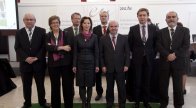
This issue starts with an interview with Raphaël Goulet, Head of Unit, and Peter Fischer, Communications and Information Officer, from the Information and Communication Unit of the Regional Policy Directorate-General
A couple of days prior to Europe Day the EU Institutions organize an Open Doors Day that provides a possibility for the citizens to experience Europe's regional diversity by visiting the Committee of the Regions.
The European Commission has launched a consultation on the modernisation of the EU public procurement policy, open till the 18 April.
The EGTC working group meeting was held at the Ministry of Public Administartion and Justice on 20 April 2011.

Regional and local authorities wishing to work together across national borders are still struggling with red tape, Committee of the Regions President Mercedes Bresso stressed today. Joining Hungarian Minister of State Erika Szabó at a conference in Gödöllő, President Bresso urged lawmakers to simplify the EU rules governing such cooperation, and open them up to social partners and non-EU countries.
The EGTC 'Pons Danubii' was officially established on 16 December 2010.
Mayors and regional presidents urged EU lawmakers to simplify the rules for delivering cross-border infrastructures and public services to citizens. At the Committee of the Regions plenary session in Brussels, they set out ways to improve a key legal tool, the European Grouping of Territorial Cooperation (EGTC). They also launched a platform for public authorities setting up and running such cross-border bodies.
The "ABAÚJ-ABAÚJBAN European Grouping of Territorial Cooperation" (Development Partnership), which has been developed on the basis of a Hungarian-Slovakian international partnership, was officially registered at the Budapest Metropolitan Court on 11 June 2010.
The Committee of the Regions organized the European Conference on European Grouping of Territorial Cooperation on 27th and the 28th January 2011.
On 20 December 2010 the European Commission published a Communication which outlines the most serious tax problems that EU citizens face in cross-border situations and announces plans for solutions.